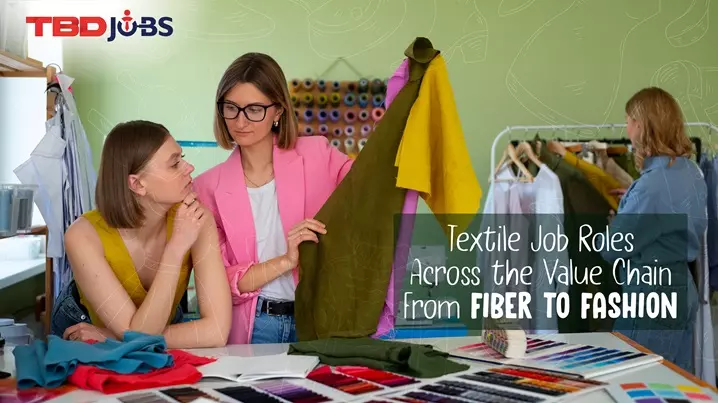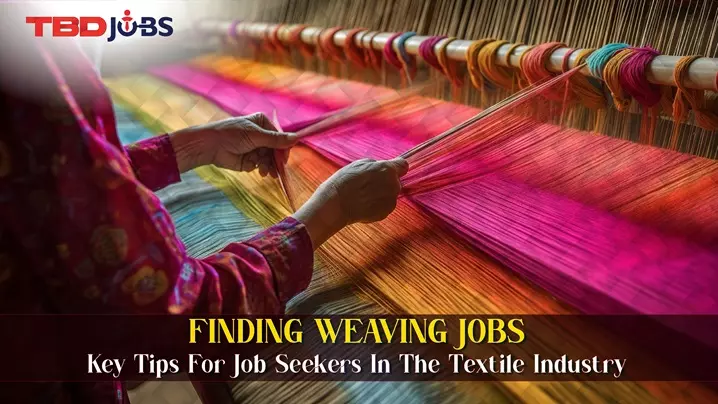Traditionally, the textile industry has adapted to a technological transformation with its weaving looms and dyeing units. The sector of producing clothes is no longer just about wearing clothes and industrial applications. Still, it has brought a wave of technology, innovation, and sustainability into clothing and industrial applications. This trend brings out a fresh wave of career development, especially in jobs demanding specific specialised textile skills, especially a Textile Diploma. If you want to pursue a Diploma in Textile Jobs, now is the best time to plunge into this fast-growing and ever-changing field.
Evolving Smart Fabrics in Textiles
Smart fabrics or e-textiles refer to materials that include digital components, such as sensors, batteries, LEDs, and other electronics. These fabrics could be used in health monitoring, fitness, style, and defence. There is a need for skilled workers who can use balanced skills in traditional textile techniques with a breadth of advanced technologies.
Textile Diploma Jobs: Where Tradition Meets Innovation
Textile careers are rooted in ancient practice areas: textile design, engineering, processing, and technology. Smart fabrics also opened new doors by exponentially expanding the scope of textile diploma jobs. Companies are searching for professionals who can combine traditional techniques with new inventions.
With a Diploma in Textile Design, you can enjoy the possibility of designing smart fabrics, where technology meets creativity. Your role would be in designing textiles for aesthetic appeal and technological advancements. Smart clothes from the fashion, sportswear, or healthcare industries herald a new era and change how we perceive and use clothing products daily.
Diploma in Textile Engineering Jobs: Shaping the Future of Textiles
A diploma in textile engineering is designed to create the technical expertise required by innovators working in textiles. Due to the increasing usage of smart textiles, engineers are now expected to successfully implement sensors, conductive threads, and other electronic components into textiles. For instance, they will be an asset to IoT and wearable technology companies.
Engineers with a textile degree can also work in R&D, product development, quality assurance, and production management. Their skill is crucial in creating strong but versatile functional textiles for special applications within automotive, aerospace, and medical textiles.
Diploma in Textile Processing Jobs: Bringing Smart Fabrics to Life
Processing is another significant sector of textile production encompassing dyeing, printing, finishing, and coating. Applying for a diploma in Textile Processing will help professionals assess smart textiles in their applications, processing, and development by enhancing the properties of fabrics through special finishes that make materials water-resistant, anti-bacterial, UV-protected, etc.
Smart fabrics normally involve special processing that requires professionals to bridge the gap between traditional processing and modern needs. Currently, industries need textile processors to improve production techniques to continue integrating electronics into fabrics.
Diploma in Textile Technology Jobs: Innovation in the Textile Industry
The areas of Diploma in Textile Technology focus on the science behind textiles and their behaviour. This diploma goes deep into the knowledge of textile properties, fiber science, and machinery in fabric manufacturing. The entry of smart fabrics has opened up wider opportunities for textile technologists who must innovate new material development, prototype testing, and tech-driven fabric solutions in the market.
More innovative functionalities like temperature control, bio-monitoring, and energy harvesting offer opportunities for developing fabrics. Textile technologists can use these to enter technical consultancy, quality control, product testing, and material research.
Textile Diploma Base Jobs: Exploring Opportunities in Smart Fabrics
Smart textile is rapidly changing the world of textile diploma-based jobs at a fast speed, concerning all phases related to Design and engineering, technology, and processing.
Some of the Job Avenues for the Same After Completing a Diploma in the Textile Domain are Given Below:
- Smart Fabric Designer:- Diploma in Textile Design Advanced designers with a diploma in textile design can usually work with new materials and technology. Smart fabric designers design attractive textiles with features like thermal regulation, moisture control, and electronic sensors.
- Textile Product Developer:- Product developers are the ones who make smart fabrics a reality from the drawing board. This occupation requires integrating Design with engineering, making it an ideal fit for someone with a Diploma in Textile Engineering. In this capacity, they collaborate closely with designers, engineers, and manufacturers to develop specific industrial textiles requirements.
- Textile Engineer for Wearable Technology:- A Diploma in Textile Engineering will also take one directly to wearable technology, where one can focus on integrating electronic components into fabrics. These engineers must ensure that smart textiles feel comfortable, durable, and functional.
- Textile Quality Assurance Specialist:- It can be a route to quality assurance, where specialists monitor the quality and durability of smart textiles. These experts ensure the fabrics meet industry standards and fit their intended purposes, which range from healthcare to fashion.
- Textile Technologist for R&D:- The person holding a Diploma in Textile Technology is eligible for a career in research and development, creating new fabrics with greater functionalities. The R&D technologists have an integral role in expanding textile applications by experimenting with new materials and testing their properties.
Why a Career in Smart Fabrics?
In the coming years, demand for smart textiles will boost exponentially. As technology and awareness among consumers build up, the global smart fabric market will likely touch billions of dollars by the end of the decade.
Here are Some Reasons Why a Career in Smart Fabrics is The Right Choice:
- Spike in Demand:- The marriage of textiles with technology has also led to rising demands for knowledgeable professionals. Now, firms are searching for people with special knowledge about textiles and technology.
- Job Roles in Diversification:- From Design to production, from QA to R&D, smart fabric industries offer employment opportunities to diploma holders in textile diversification.
- Innovation and Creativity:- Smart fabrics are the field for innovation and creativity. Here, one gets the freedom to conquer all the barriers and be creative in developing new innovative ideas in the light of fashion, health, defence, and much more.
- Good Packages:- The sector's niche is very specific, so the salary is normally higher than in the textile industry.
- Sustainability Focus:- Sustainable focus is usually achieved through Smart Textiles, manufacturing with environment-friendly materials and energy-efficient technologies. It meets the trend for sustainable and green innovation in the fashion and textile industries.
Important Skills for a Career in Smart Fabrics
- Fabric Property Knowledge:- Thorough knowledge of the properties of textiles, such as fiber strength, elasticity, and endurance.
- Technical:- Up-to-date and general knowledge about electronics, sensors, and conducting materials.
- Design Skills:- Ability to design both aesthetically beautiful and functioning fabrics creatively
- Problem-solving Skills:- Troubleshoots issues that arise in technology integration in textiles.
- Project Management:- Design and production projects are overseen by the person.
Explore Textile Diploma Base Jobs with TBD Jobs
To join the smart fabrics industry, TBD Jobs has many options for textile diploma graduates. Along with possible internships and entry-level positions to managerial-level jobs, TBD Jobs connects such skills-based professionals with companies at the helm of innovation in the textile field.
Opportunities in Textile Diploma Jobs have never been brighter; smart textiles are booming, and interest is growing daily. Look for job opportunities such as smart fabric designer, textile engineer, product developer, quality assurance specialist, and R&D technologist on TBD Jobs. With the right set of skills and a diploma in textiles, all possibilities lie bright in the future.
Conclusion
Technology is merging with textiles in a revolution within the sector. There are many opportunities for these holders of diplomas-from Design and engineering to processing and technology, the promises of the smart fabrics sector read like an exciting promise. Innovative and sustainable solutions are transforming the world, and the textile industry is no exception.
Keeping abreast with the latest trends and honing skills are easy ways to position oneself as a sought-after professional in this swiftly growing field. Platforms like TBD Jobs have always been challenging to find the right career opportunity. So, are you ready to embark on the future of textiles? Well, the time is now.
Find the latest Textile Diploma Jobs and see your career take off in the world of smart fabrics. Textiles go beyond threads and yarns and dive into the really important stuff: technology, innovation, and much more. Dive in; make your mark.













.webp)













Leave a Comment
3 Comments
30 Sep 2025, 10:17 AM
14 Oct 2025, 09:23 PM
29 Sep 2025, 03:31 AM